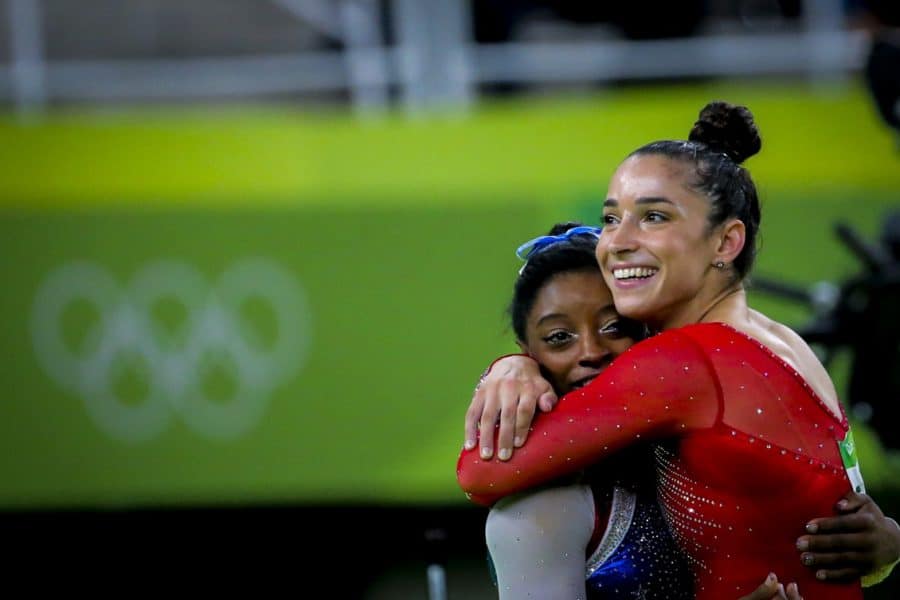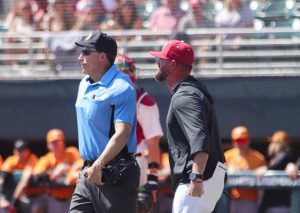What are the twisties? UA club gymnasts share their experiences
August 29, 2021
During Simone Biles’ vault performance at the 2021 Tokyo Olympics, she got lost in the air. Luckily, she landed on her feet, but she decided to back out of the all-around competition for her safety. Caroline Austin, a member of the UA club gymnastics team, said Biles’ decision was necessary for both her safety and Team USA’s success in Tokyo.
Biles, a seven-time Olympic medal-winning gymnast, received backlash for leaving the competition at the Tokyo Olympics.
Unstable mental health can put gymnasts at risk of injury. Like Biles, Austin has experienced a mental block, known as “the twisties” within the gymnastics community.
“The mind controls the body, so it is important for gymnasts to be mentally prepared when performing a skill,” Austin said.
To reduce the risk of injury from a mental block, Austin said it’s crucial for gymnasts to be prepared mentally and physically before attempting a skill, whether new or one they’ve practiced for years.
Since Austin has experienced a mental block firsthand, she knows how difficult it can be to overcome it. It can take gymnasts weeks, months or even years to overcome it, so the odds of Biles overcoming her fear in a day was unlikely.
Although Biles is a highly trained Olympic gymnast, Austin said there is always a risk of injury.
Kendra Zebroski, a member of the UA club gymnastics team, said the sport involves dangerous movements that involve weirdly shaped apparatuses.
Zebroski said she suffered a mental block after breaking her ankle while connecting two skills on the balance beam. It took her a while to get comfortable with the skill again.
Zebroski said she knew that it would be challenging to regain the skill, but she focused on her mental health to give it her best shot. Once she got the skill back, she successfully competed the skill the following season.
Like Austin, Zebroksi said she agrees with Biles’ decision to step away from the all-around competition. Both Austin and Zebroski have experienced the “twisties” so they understand where Biles is coming from. Even then, Biles’ experience is different.
“We can’t be in Simone’s head knowing exactly what is going on, and dealing with mental health is different for everyone,” Zebroski said.
John Burkhardt, UA associate professor of psychiatry and behavioral medicine, said gymnastics requires optimal performance and involves intricate visual components.
He said it’s normal for athletes to feel nervous or be fearful because they care about how their performances will turn out. However, athletes can’t let nerves get the best of them, or they run the risk of not performing their best — or worse, getting injured.
“There is an optimal place for just the right amount of nerves and anxiety so that you can focus and function,” Burkhardt said.
If something is bothering an athlete mentally, Buckhardt said their physical performance may suffer. He said Biles made the right choice for herself because only she knows her mental and physical ability.
Unlike other athletes, Buckhardt said Biles was “brave enough to actually say why she backed out.” Many other athletes have applauded her for telling the truth.
“She probably knew that, by backing out, her decision was going to get overanalyzed by people,” Burkhardt said.
Biles said in an interview with PBS that stepping forward about her mental health was one of her proudest moments.
“Put mental health first because if you don’t, then you’re not going to enjoy your sport and you’re not going to succeed as much as you want to,” Biles said.
In their time as gymnasts, Austin and Zebroski said they have learned multiple ways to cope with nerves. Austin’s coaches gave her pep talks, which calmed her nerves before a skill.
Zebroski prefers alone time before competitions to listen to music, and she visualizes her performance to gain a sense of comfort before performing a skill.
These mental blocks can be beat; it may just take some time and help.
“My mental and physical health is above all medals I could ever win,” Biles said in an article for Netherland News.




















